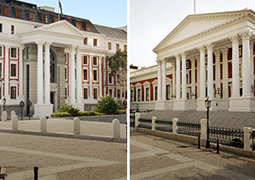
Parliament, Monday, 4 December 2023 – Parliament welcomes the Constitutional Court’s ruling today on the rationality of the Electoral Amendment Act as it relates to the 50% split of seats in the National Assembly (NA).
The Court ruled against the Independent Candidates Association South Africa NPC’s application which challenged the rationality and reasonableness of the 200/200 seat split in the NA.
In terms of Schedule 1A of the recently amended Electoral Act, the seats in the National Assembly will be divided in equal halves. This means the first 200 seats are awarded to regional or provincial votes and the other half is reserved for compensatory or national votes. The 200 regional seats are available for independent candidates to contest for while the other 200 compensatory or national seats are to ensure that the election is proportionally representative. Only political parties can contest for these seats.
The Independent Candidates Association South Africa NPC’s application challenged this split and asked the Court to consider its proposed alternative split of 350/50 seats, which would allow independent candidates to contest for up to 350 seats and not just 200.
The Constitutional Court reasoned that both the 200/200 and 350/50 split would meet the constitutional threshold and that it was not for the Court to prescribe to the legislature which of these to opt for.
Today’s ruling underscores the rigorous process that Parliament undertook to apply its mind and consider all pertinent issues relating to proportional representation as guided by the Constitution.
The applicant, Independent Candidates Association South Africa NPC, the Court ruled, could not prove that the 200/200 split is arbitrary. The Court found that the impugned schedule does not infringe any of the fundamental rights in the Constitution and the elements for free and fair elections are met under the split.
Meanwhile, in the application of One Movement SA NPC the court was called upon to consider section 31(B)(3) which requires “an independent candidate and a new political party – that is, a political party that is not yet represented in the National Assembly or in any Provincial Legislature – to secure and produce supporting signatures of registered voters in the relevant region amounting to 15% of the quota of the relevant region in the preceding election in order to be allowed to contest an election”.
OSA argued that the signature threshold of 15% creates an unreasonable barrier to entry for independent candidates to register for elections, thus infringing their rights to contest. It also contends that the recalculation formula, when seats are forfeited in the National Assembly or provincial legislatures or when vacancies arise, disproportionately favors political parties with larger votes over parties with smaller votes and independent candidates.
The majority ruled in favour of the applicant on the signature issues but agreed with Parliament’s position on the recalculation issue. The court consequently declared section 31B (3)(a)(i) and (ii) of the Electoral Act 73 of 1998 (Electoral Act) as inserted by the Electoral Amendment Act 1 of 2023 “constitutionally invalid as it unjustifiably limits the rights to freedom of association, freedom to make political choices and to stand for public office”. It also provided a read-in remedy bringing the 15% down to 1000 signatures for independent candidates.
Delivering the majority ruling, Judge Jody Kollapen said, “The declaration of invalidity referred to is suspended for 24 months from the date of this order to afford Parliament an opportunity to remedy the constitutional defects giving rise to the constitutional invalidity.”
An amendment would be necessary in due course to ensure that the statute book is aligned with the judgment.
Parliament remains unwaveringly committed to protecting every citizen’s right to participate in elections freely and fairly.
ISSUED BY PARLIAMENT OF THE REPUBLIC OF SOUTH AFRICA
For enquiries: Mr Moloto Mothapo

